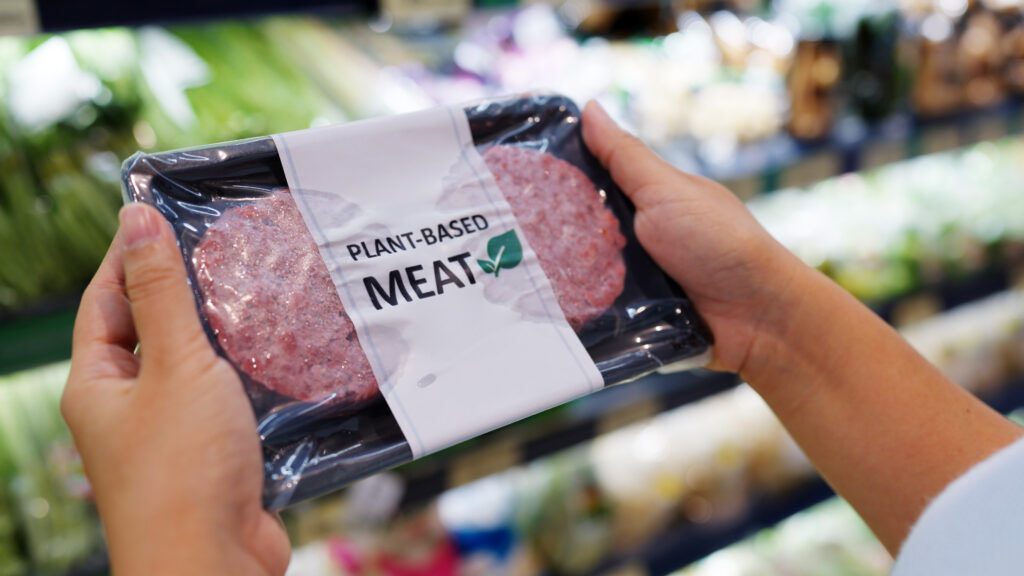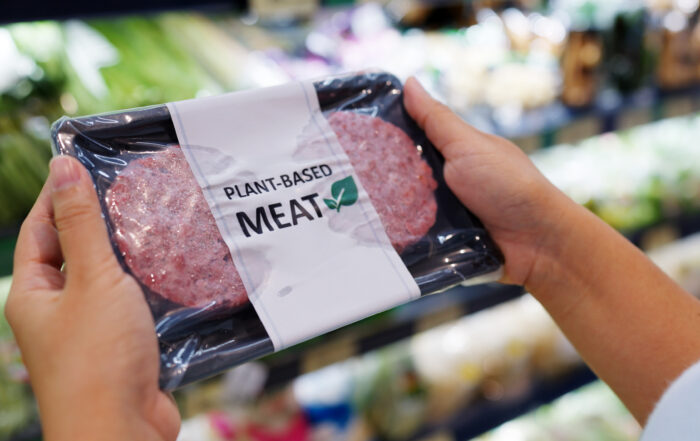
What’s in a Name? Updates on Plant-Based Product Labeling Regulations
By Kyle Diamantas & Kelly G. Laudon
Introduction
Rapid advancement in plant-based alternative options to meat, milk, and other animal-derived products is driving significant investment and expansion in the plant-based market. From 2018 to 2021, the plant-based market grew by 54%.[1] In 2021, investment in the plant-based industry was $1.93 billion,[2] and sales of plant-based food grew three times faster than total food sales.[3] The retail market for plant-based foods was $6.9 billion in 2020 and $7.4 billion in 2021.[4] In the next decade, industry experts expect the plant-based market to exceed $160 billion and make up nearly 8% of the global protein market.[5]
While the plant-based market is an exciting growth opportunity, industry participants face uncertainty due to the lack of regulatory clarity. Production and innovation of plant-based foods have grown rapidly, but federal regulation lags behind those developments. In the absence of clear federal regulation on product labeling, industry is forced to navigate uncertainty and accompanying legal risk. State laws cause further complexity by imposing different restrictions on how plant-based foods can be labeled.
Federal Regulation of Plant-Based Products
I. FDA Regulates Plant-Based Products
The U.S. Food and Drug Administration (FDA) regulates the production and labeling of plant-based foods. But the agency has not yet promulgated regulations or formal guidance specifically addressing plant-based alternatives to animal-derived ingredients and generally has exercised enforcement discretion in the plant-based food space. Additionally, the United States Department of Agriculture (USDA) has concurrent jurisdiction with FDA over meat and poultry products, but to date has declined to enter the plant-based meat regulatory space. For instance, in February 2018, USDA received a petition from the U.S. Cattlemen’s Association, requesting that that agency limit the definition of “beef” and “meat” to traditional sources (i.e., products derived directly from animals).[6] This action sought to prohibit the labeling of products made using plants or animal cell culture from including terms such as “meat” or “beef.” More than three years later, USDA denied the petition, in part because it “does not have jurisdiction to regulate the labeling of products derived from sources that are not amenable to the [Federal Meat Inspection Act] or [Poultry Products Inspection Act], such as plant-based products.”[7] Rather, it stated that FDA is responsible for regulating such products under the Federal Food, Drug, and Cosmetic Act (FDCA), and whenever USDA “is made aware that a non-animal product is being labeled as ‘meat’ or ‘beef,’” it refers such information to FDA.
In the absence of specific guidance, plant-based food manufacturers and other supply chain participants must consider how long-standing regulations may be interpreted with respect to these new types of products.
II. FDA Regulatory and Enforcement Action
Under the FDCA, a food is deemed misbranded if it purports to be “a food for which a definition and standard of identity has been prescribed by regulations” and it fails to meet that standard.[8] Some, including dairy and meat trade groups and state and federal legislators, have raised concerns that consumers will be misled by plant-based products that use labeling terms traditionally associated with animal-derived ingredients, for example, “milk” and “meat.”[9]
Since 1939, FDA has established more than 250 standards of identities (SOI) for foods, which “describe in detail what a food must contain and what is optional and sometimes describe the amount or proportion of ingredients or components.”[10] Many SOIs also specify a method of production or formulation.[11] For example, the SOI for milk is defined as “the lacteal secretion, practically free from colostrum, obtained by the complete milking of one or more healthy cows.”[12] As famously noted by former FDA commissioner Scott Gottlieb, “[a]n almond doesn’t lactate.” Thus, almond milk, like other plant-based milks, does not meet FDA’s SOI for milk. This definition is proving to be contentious in the fight regarding how to label plant-based foods.
In 2018, as part of its Nutrition Innovation Strategy, FDA tasked itself with “updating its SOI program with the goal of maintaining the basic nature and essential characteristics of standardized foods while permitting flexibility with respect to their composition.”[13] The agency hopes to support the production and innovation of healthier food and allow for continued innovation in the marketplace, including updating SOIs to reflect modern technologies and processing methods.[14] Whether FDA’s SOI program update will address novel issues raised by plant-based alternative options to meat, milk, and other animal-derived products remains to be seen.
Similarly, some dairy and meat trade groups have argued that plant-based food labels violate FDA regulations related to imitation foods.[15] Those regulations provide, in general, that “[a] food shall be deemed to be an imitation . . . if it is a substitute for and resembles another food but is nutritionally inferior to that food.”[16] FDA’s regulations further require that the labeling for imitation foods bear the term “imitation” immediately before or after the name of the food imitated, for example, “imitation cheese.” Nutritional inferiority includes “[a]ny reduction in the content of an essential nutrient that is present in a measurable amount, but does not include a reduction in the caloric or fat content.”[17] FDA has not yet formally weighed in on the issue, and given the disparity in scientific opinions on the matter, is unlikely to directly address whether plant-based products should be labeled as “imitation” foods. Rather, it seems more likely to address the labeling issue through its process of modernizing SOIs.
Finally, the FDCA deems a product misbranded if “its labeling is false or misleading.”[18] Several court cases have reviewed the issue of label confusion in the context of state consumer protection laws, which generally prohibit false, misleading, or deceptive labeling. To date, courts have generally not found a likelihood of consumer confusion between animal and plant-based products.[19] Various studies have also shown that a majority of American consumers understand that plant-based milks contain no cow milk.[20] While American consumers largely understand that popular plant-based products, like almond or soy milk, contain no animal-derived ingredients, that familiarity may not extend to all plant-based products. As a result, manufacturers should take care to clearly label their products as plant-based to the extent they are offered as an alternative to an historically animal-derived product.
One of the few notable actions taken by FDA in the plant-based food space offers some guidance to manufacturers. In 2015, the agency issued a Warning Letter to Hampton Creek, the producer of an eggless mayonnaise-like product. Mayonnaise, commonly referred to simply as “mayo,” is subject to an SOI that includes eggs as a required ingredient.[21] FDA warned the manufacturer that the name of the product, “Just Mayo,” and the logo, which depicted a “cracked” egg, might mislead consumers into thinking that the product actually contained eggs. However, FDA ultimately allowed Hampton Creek to keep the “Just Mayo” name and egg image, as long as it made minor changes to its label to highlight that the product did not contain egg, including adding the phase “egg-free” prominently on the front of the package.[22] While FDA has generally continued to exercise enforcement discretion with respect to the labeling of plant-based alternatives, clarity and consistency for such practices may soon arrive through agency guidance.
III. Anticipated FDA Guidance on Plant-Based Product Labeling
In September 2018, FDA issued a request for public comment to address the labeling of plant-based milk, cheese, yogurt, and other dairy products.[23] In its notice of extension of the comment period, the agency stated that it “supports choice and innovation in the marketplace . . . [but] has concerns that the labeling of some plant-based products, which can vary widely in their nutritional content, is leading consumers to believe that those products have the same key nutritional attributes as dairy products.”[24] By the time the comment period closed at the end of January 2019,[25] FDA had received more than 11,900 comments, with more than three-quarters in support of dairy terminology for plant-based products.[26]
In 2021, the House Committee on Appropriations issued a report in which it expressed concern about “assertions” that the labeling of plant-based products using traditional meat, dairy, and egg terminology could be “misleading, deceptive, and confusing to consumers.” The Committee “encourage[d] FDA to provide clarity around labeling of plant-based foods that use traditional meat, dairy, and egg terminology especially as it relates to such product labels with clear and conspicuous descriptors such plant-based, veggie, vegetarian, or vegan.”[27]
In January 2022, FDA announced plans to begin working on draft guidance for labeling of plant-based alternatives to milk and animal-derived foods with a goal of publishing drafts or final guidance documents by year-end.[28] On March 31, 2022, FDA submitted a draft of one policy, “Labeling of Plant-based Milk Alternatives and Voluntary Nutrient Statements,” to the Office of Management and Budget (OMB) for approval.[29] In May 2022, four members of Congress sent a letter to OMB regarding “potential inclusions such as special regulations for non-dairy products using qualifying terms,” like oat or soy, “and ‘milk’ in their names.”[30] The letter to OMB expressed concern that FDA’s draft guidance could require or recommend that plant-based milks identify differences in nutritional components against dairy milk. To the extent the draft guidance contains such provisions, the legislators urged OMB to “return it to [FDA] without moving forward.” They argued that, even if voluntary, asking plant-based milks to add additional disclosures “without doing the same for animal milk is discriminatory towards the plant-based industry.”
Federal regulators have not been active in pursuing action against food manufacturers producing plant-based alternatives. Nonetheless, manufacturers should take care to ensure their labels clearly and prominently express to the consumer that the product contains no animal by-products, for example with an “egg-free,” “dairy-free,” or “vegan” claim on the front of the package. Manufacturers must also keep apprised of legislation in states in which they sell their products to ensure compliance with applicable state laws.
State Labeling Laws
In the absence of clear federal regulations governing the labeling of plant-based foods, states have attempted to fill the void, passing and proposing laws that impose labeling requirements for such products. Touted as restrictions that will either safeguard consumers from confusion or protect local agriculture industries,[31] these state laws seek to curb the use of traditional meat and dairy terms like “meat” and “butter” on the labels of non-meat products. So far, at least 13 states have passed labeling laws, and several other states have proposed legislation regarding this issue.[32]
The content and restrictions of these laws vary widely. Some statutes permit “qualified labels” that either include “plant-based,” “vegan,” or other language indicating that the food is plant-based on the packaging “prominently” or “conspicuously.”[33] Other states, like Arkansas, prohibit alternative meat products from “misrepresenting” or using any language that is associated with meat-based products.[34] Using terms such as “burger,” “bacon,” or “deli slices” for plant-based products, for example, would not be permitted in these states. Some states have since issued regulations that would permit this type of language so long as the label includes clear qualifying language.[35] Missouri has even criminalized labeling foods as meat when the product does not come from animals; a violation of its labeling law is a Class A misdemeanor.[36]
Unsurprisingly, these labeling laws have faced scrutiny from a variety of parties, including plant-based manufacturers and industry groups, animal rights organizations, think tanks, and free speech advocates.[37] Numerous lawsuits have been filed asserting that the labeling laws violate the First Amendment. The results of the lawsuits so far have been mixed. Examples of recent decisions are below:
- Arkansas: Turtle Island Foods (d/b/a Tofurky) won a preliminary injunction in federal district court in Arkansas, preventing the state from enforcing its label law against the company on the grounds that the law likely violated the First Amendment.[38]
- Oklahoma: The Plant Based Foods Association and Turtle Island Foods brought suit against Oklahoma, alleging that the labeling requirements constituted a violation of the First Amendment.[39] The court denied plaintiffs their requested injunction, holding that the use of traditional meat terminology had the potential to confuse shoppers.[40] Requiring that plant-based disclosures be in the same size and type as the product’s name would alleviate this confusion and was reasonably related to the government’s interest in protecting consumers. Plaintiffs have since filed an amended complaint, asserting that Oklahoma’s law is vague, overly burdensome, and preempted by federal law.[41]
- Missouri: A federal district court declined to grant Tofurkey and Good Food Institute a preliminary injunction on the grounds that Missouri’s label censorship law was not likely to apply to Tofurky’s product labels.[42] The Missouri Department of Agriculture had issued a memorandum with guidance on the law, which would make it unlikely that Tofurkey would be harmed by the statute’s enforcement. On appeal, the circuit court upheld the ruling, agreeing that the law did not apply to Tofurky’s labels.[43]
Though California has not passed a state law restricting plant-based labeling, California’s Department of Food and Agriculture notified plant-based dairy company Miyoko’s Kitchen that the labels the company used for its vegan butter violated state and federal law.[44] The state directed Miyoko to stop using the term “butter” on its labels, arguing that the use of the word “butter” was already defined under federal law and Miyoko’s product did not meet that definition. The state also prohibited Miyoko from using the phrases “lactose free,” “cruelty free,” and “revolutionizing dairy with plants,” claiming these phrases improperly implied to consumers that the vegan butter was a cow-dairy product.[45] Miyoko brought suit against the state agency in California federal court, arguing that directive violated its First Amendment rights. The court granted summary judgment in part to Miyoko, finding that the term “butter” was not inherently misleading just because federal law had given it a definition and that Miyoko’s use of the terms were protected by the First Amendment and not misleading.[46]
In addition to constitutional free speech arguments, preemption arguments likely will apply once FDA takes action in this space.[47] As noted above, FDA is currently working on modernizing food SOIs and developing formal guidance in connection with labeling of such products. If FDA sets a definition for the terms addressed by these state statutes, any state statutes setting a different standard may likely be found preempted by federal regulation.
Conclusion
The regulatory landscape concerning plant-based labeling is likely to change in the near future. Although FDA has a history of minimal intervention in this space, it has recently indicated that it will issue regulations and guidance to address the innovation and growth of plant-based products. In the meantime, state lawmakers will likely continue to propose laws regulating plant-based labeling, and industry actors will also likely continue filing suits challenging such laws. Recent court decisions are mixed on the issue and demonstrate the overall lack of consensus regarding the balance of free speech and state government interests. There remains disagreement as to whether plant-based labels actually cause any meaningful consumer confusion or whether such products offer comparable nutritional benefits to their animal-derived counterparts. This once nascent but now booming industry currently faces uncertainty and ambiguity in the regulations that apply to it. And until FDA issues specific guidance and regulatory clarity and arguably seeks to preempt the patchwork of conflicting and inconsistent state laws, manufacturers will want to promote labeling practices that sufficiently impress upon consumers the plant-based nature of the food.
[1] Good Food Institute, 2021 U.S. Retail Market Insights: Plant-based Foods 3 (2022) [hereinafter GFI 2021 U.S. Retail Market Insights], https://gfi.org/wp-content/uploads/2022/03/2021-U.S.-retail-market-insights_Plant-based-foods-GFI.pdf.
[2] Good Food Institute, 2021 State of the Industry Report: Plant-based Meat, Seafood, Eggs, and Dairy 8 (2022) [hereinafter GFI 2021 State of the Industry Report], https://gfi.org/wp-content/uploads/2022/04/2021-Plant-Based-State-of-the-Industry-Report-1.pdf.
[3] GFI 2021 U.S. Retail Market Insights, supra note 1, at 3.
[4] Id.
[5] Press Release, Plant-based Foods Market to Hit $162 Billion in Next Decade, Projects Bloomberg Intelligence, Bloomberg (Aug. 11, 2021), https://www.bloomberg.com/company/press/plant-based-foods-market-to-hit-162-billion-in-next-decade-projects-bloomberg-intelligence/.
[6] U.S. Cattlemen’s Association, Petition for the Imposition of Beef and Meat Labeling Requirements, U.S. Dep’t of Agric., Food Safety & Inspection Serv. (Feb. 9, 2018), https://www.fsis.usda.gov/sites/default/files/media_file/2020-07/18-01-Petition-US-Cattlement-Association020918.pdf.
[7] U.S. Dep’t of Agric., Food Safety & Inspection Serv., Letter to Dr. Brooke Miller, President U.S. Cattlemen’s Association (Sept. 16, 2021) [hereinafter FSIS Letter to USCA, 2021], https://www.fsis.usda.gov/sites/default/files/media_file/2021-09/18-01-Final-Response-09162021.pdf.
[8] 21 U.S.C. § 343.
[9] E.g., National Milk Producers Federation, Letter to Dockets Management Staff, U.S. Food & Drug Administration, Docket No. FDA–2018–N–3522, Use of the Names of Dairy Foods in the Labeling of Plant-Based Products (Jan. 28, 2019), https://www.nmpf.org/wp-content/uploads/2018/10/NMPF-Comments-to-FDA-Docket-No-2018-N-3522.pdf.
[10] Standards of Identity for Food, U.S. Food & Drug Admin. [hereinafter FDA Standards of Identity], https://www.fda.gov/food/food-labeling-nutrition/standards-identity-food (last visited July 29, 2022).
[11] Id.
[12] 21 C.F.R. § 131.110(a).
[13] FDA Standards of Identity, supra note 10.
[14] Id.
[15] E.g., Imitation Dairy, Nat’l Milk Producers Fed’n, https://www.nmpf.org/issues/labeling-standards/imitation-dairy-beverages/ (last visited July 27, 2022).
[16] 21 C.F.R. § 101.3(e).
[17] 21 C.F.R. § 101.3(e)(4).
[18] 21 U.S.C. § 343.
[19] See, e.g., Painter v. Blue Diamond Growers, No. 17-02235, 2017 WL 4766510 (C.D. Cal. May 24, 2017), aff’d, 757 F. App’x 517 (9th Cir. 2018); Gitson v. Trader Joe’s Co., No. 01333, 2015 WL 9121232, at *2 (N.D. Cal. Dec. 1, 2015).
[20] Shannon Campagna, PBFA Oral Remarks at FDA Hearing (July 26, 2018), https://www.plantbasedfoods.org/pbfa-testifies-at-fda-meeting-on-modernizing-food-labeling; Emily Monaco, Consumers Aren’t Confused by Dairy and Plant-Based Milk Labels, Survey Shows, Organic Authority (May 7, 2019), https://www.organicauthority.com/buzz-news/consumers-understand-the-difference-between-dairy-and-plant-based-milk-survey-shows.
[21] 21 C.F.R. § 169.140.
[22] Stephanie Strom, F.D.A. Allows Maker of Just Mayo to Keep Product’s Name, N.Y. Times (Dec. 17, 2015), https://www.nytimes.com/2015/12/18/business/fda-allows-maker-of-just-mayo-to-keep-products-name.html.
[23] Use of the Names of Dairy Foods in the Labeling of Plant-Based Products, 83 Fed. Reg. 48905, 49103 (Sept. 28, 2018) (notice and request for comments); Use of the Names of Dairy Foods in the Labeling of Plant-Based Products, 83 Fed. Reg. 58721, 58775 (Nov. 21, 2018) (notice; extension of comment period).
[24] FDA Extends Comment Period on Use of the Names of Dairy Foods in Labeling Plant-Based Products, U.S. Food & Drug Admin. (Nov. 20, 2018), https://www.fda.gov/food/cfsan-constituent-updates/fda-extends-comment-period-use-names-dairy-foods-labeling-plant-based-products.
[25] Id.
[26] Ron Tanner, 4 FDA Guidance Topics That Could Affect Specialty Food, Specialty Food Ass’n (Mar. 29, 2022), https://www.specialtyfood.com/news/article/4-fda-guidances-could-affect-specialty-food-industry/.
[27] Rep. Bishop’s Amendment to Agriculture, Rural Development, Food and Drug Administration, and Related Agencies Appropriations Bill for Fiscal Year 2022, House Comm. on Appropriations, June 30, 2021.
[28] Foods Program Guidance Documents Under Development, U.S. Food & Drug Admin. (Jan. 2022), https://www.fda.gov/media/150430/download.
[29] Letter from Members of Congress to Shalanda Young, Director, White House Off. of Mgmt. & Budget (May 18, 2022), https://www.booker.senate.gov/imo/media/doc/plant-based_milk_guidance_letter_to_omb.pdf.
[30] Id.
[31] See, e.g., Ark. Code Ann. § 2-1-301 (“The purpose of this subchapter is to protect consumers from being misled or confused by false or misleading labeling of agricultural products that are edible by humans.”); Complaint at ¶ 43, Turtle Island Foods v. Strain, No. 3:20-cv-00674 (M.D. La. Oct. 7, 2020) (quoting state legislators in Louisiana stating that “everybody in here is wanting to protect the interest of our rice farmers and our beef farmers and so on,” “[e]veryone wants to protect the industries in Louisiana,” and “[w]e must protect our industry in this state. Agriculture. It’s the number one industry in the state of Louisiana.”).
[32] Alabama, Arkansas, Georgia, Kentucky, Louisiana, Mississippi, Montana, Missouri, North Dakota, Oklahoma, South Carolina, South Dakota, and Wyoming have all passed labeling laws, some of which also include restrictions for cell-cultivated foods. States where food-labeling legislation has failed include Arizona, Colorado, Hawaii, Illinois, Indiana, Iowa, Kansas, Maryland, Michigan, Nebraska, New Mexico, Tennessee, Texas, Vermont, Virginia, Washington, and Wisconsin.
[33] Ga. Code Ann. § 26-2-152. “It shall be unlawful for any person . . . to label, advertise, or otherwise represent any food produced or sold in this state as meat or any product from an animal unless each product is clearly labeled by displaying the following terms prominently and conspicuously on the front of the package . . . [for] plant based products as “vegetarian,” “veggie,” “vegan,” “plant based,” or other similar term indicating that the product is plant based and does not include the flesh, offal, or other by-product of any part of the carcass of a live animal that has been slaughtered.” Wyoming also has a similar law that requires clear labeling using plant-based phrases. Wyo. Stat. Ann. § 35-7-119.
[34] Ark. Code Ann. § 2-1-301 (“A person shall not misbrand or misrepresent an agricultural product that is edible by humans . . . .”).
[35] For example, Missouri’s Department of Agriculture has provided guidance on its law, stating that alternative meat product labels must include a prominent statement disclosing that the product is plant-based or lab-grown or a similar qualifier. Mo. Dep’t of Agric., Memorandum Re: Missouri’s Meat Advertising Law (Aug. 30, 2018), https://agriculture.mo.gov/animals/meat.php. Missouri’s labeling law can be found at Missouri Revised Statutes § 265.494 (“No person [shall misrepresent] a product as meat that is not derived from harvested production livestock or poultry.”). Mississippi has also adopted a rule allowing plant-based products to use the term meat if a qualifier like “meat free,” “plant-based,” or other similar terms are displayed on the front of the package. 02-001 Miss. Code R. § 407 (LexisNexis 2022).
[36] Mo. Ann. Stat. § 265.496.
[37] GFI 2021 State of the Industry Report, supra note 2, at 74.
[38] Preliminary Injunction Order at 28, 33, Turtle Island Foods SPC v. Soman, No. 4:19-cv-00514 (E.D. Ark. Dec. 11, 2019), ECF No. 25.
[39] Complaint ¶¶ 152–65, Upton’s Naturals Co. v. Stitt, No. 5:20-cv-00938 (W.D. Okla. Sept. 16, 2020), ECF No. 1.
[40] Order Denying Plaintiff’s Motion for Preliminary Injunction at 7–8, Upton’s Naturals Co. v. Stitt, No. 5:20-cv-00938 (W.D. Okla. Nov. 19, 2020), ECF No. 26.
[41] Amended Complaint at 4, Upton’s Naturals Co. v. Stitt, No. 5:20-cv-00938 (W.D. Okla. Nov. 23, 2021), ECF 59.
[42] Order at 14, Turtle Island Foods, SPC v. Thompson, No. 2:18-cv-04173 (W.D. Mo. Sept. 30, 2019), ECF No. 66.
[43] Turtle Island Foods, SPC v. Thompson, No. 19-3154, (8th Cir. Oct. 4, 2019).
[44] Complaint ¶¶ 20–24, 27–29, Miyoko’s Kitchen v. Ross, No. 3:20-cv-00893 (N.D. Cal. Feb. 6, 2020), ECF No. 1.
[45] See id. The state also directed Miyoko to remove the claim “hormone free” from its products. See id. ¶ 23.
[46] Order for Summary Judgment at 10–12, Miyoko’s Kitchen v. Ross, No. 3:20-cv-00893 (N.D. Cal. Aug. 10, 2021), ECF No. 73.
[47] Robert Hibbert & Amaru Sanchez, State Meat Label Restrictions Face Preemption Challenges, Law360 (Mar. 6, 2019), https://www.law360.com/articles/1135648/state-meat-label-restrictions-face-preemption-challenges.
Update Magazine
Fall 2022

 KYLE DIAMANTAS’ practice focuses on advising food, dietary supplement, cosmetic, and other life sciences clients on a wide range of FDA regulatory, compliance, and enforcement matters.
KYLE DIAMANTAS’ practice focuses on advising food, dietary supplement, cosmetic, and other life sciences clients on a wide range of FDA regulatory, compliance, and enforcement matters. KELLY G. LAUDON advises food industry clients on regulatory compliance and litigation risk management with respect to food labeling, food safety, and other state and federal requirements. Laudon also defends clients in litigation and arbitration, including claims for unlawful competition, false advertising, breach of contract and warranty, and product liability.
KELLY G. LAUDON advises food industry clients on regulatory compliance and litigation risk management with respect to food labeling, food safety, and other state and federal requirements. Laudon also defends clients in litigation and arbitration, including claims for unlawful competition, false advertising, breach of contract and warranty, and product liability.





